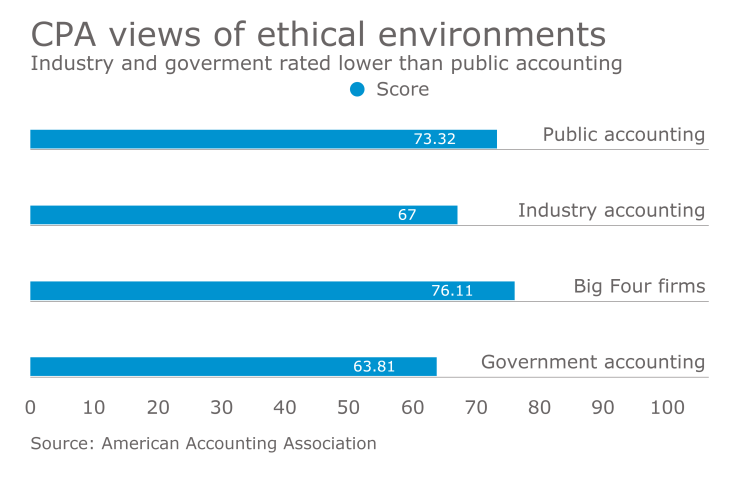CPAs employed in industry and government see the ethical environment around them as inferior to public accounting firms, according to a new study.
And despite the well-publicized lapses at the Big Four accounting firms, CPAs who work at the Big Four rate their environment as more ethical, compared to those who work in private industry and government.

The study, by Robin R. Radtke and Derek W. Dalton of Clemson University, Donna D. Bobek of the University of South Carolina, Brian E. Daugherty of the University of Wisconsin - Milwaukee, and Amy H. Hageman of Kansas State University, appears in the journal Behavioral Research in Accounting, published by the American Accounting Association.
Government accountants were particularly skeptical about the ethical environment they see around them.
“It was disheartening to find such a persistent ethics shortfall perceived in industry,” Radtke said in a statement. “And, notwithstanding the diminished trust in government reported nowadays in public surveys, it was somewhat surprising to encounter an even greater ethical lack reported there.”
The researchers were particularly surprised to see a high perception of ethics among Big Four accountants. They called the finding “counterintuitive.”
“Big Four firms are now commonly assumed to have profit maximization as their primary motivation,” they wrote.
The researchers suggested three possible reasons for the high perception of ethics at Big Four firms. With more reputational capital to lose than other public accounting firms, the Big Four have more incentive to promote strong ethical environments. The Big Four also spend more than the other firms on ethical training. In addition, they face greater risk of litigation and have deeper pockets, giving them extra motivation to maintain high ethical standards.
For the study, the researchers surveyed 904 accountants, drawing on lists from state CPA societies. The total included 676 accountants working for public accounting firms, 127 employed in industry, 62 who had government jobs, and 39 working for nonprofit organizations. They responded on a scale of 1 (for strongly disagree) to 7 (for strongly agree) to statements about their employers’ ethical norms (for example, “firm has strong ethical values”); their practices (such as, “organization has an effective ethics training program”); and outcomes (e.g., “unethical behavior is severely punished”). The more they agreed with the statements, the higher the level of perceived ethics. As there were 12 statements, the scores could range from 12 to 84.
The CPAs' average rating of the ethical environment in public accounting was 73.32, compared to 67.0 in industry accounting. Because the former was 61.32 points above the minimum of 12 and the latter only 55 points above that mark, that translated into an 11 percent advantage for public accounting over industry accounting, a statistically significant margin, according to the researchers. Even higher was the 76.11 rating for the Big Four firms, and their margin over other public accounting firms was also deemed statistically significant. The researchers saw a correlation with a study by the Association of Certified Fraud Examiners. “Coupled with the findings of the Association of Certified Fraud Examiners that accounting department employees commit the highest frequency of fraud, [our study] suggests organizations in industry may need to place more emphasis on developing and strengthening their ethical environments,” they noted.
The mean rating of the ethical environment in government was only 63.81, which put it significantly below the levels for both public accounting and industry accounting.
According to the researchers’ analysis of the factors affecting the various ethical environments, the biggest differences proved to be in ethics training. On a scale of 2 to 14, public accounting outscored industry, 11.71 to 9.86, and within public accounting the Big Four firms outpaced non-Big Four firms, by 12.86 to 11.41, with both gaps found to be statistically significant.
“Our findings may reflect the increased emphasis, particularly by Big Four firms, on ethics training and ethical behavior that has occurred since the scandals of the early 2000s, which resulted in the demise of Arthur Andersen,” the researchers noted.
“It is certainly plausible that the collapse of Arthur Andersen explains, at least to some extent, the relatively high marks for the ethics of the Big Four and public accounting,” said Radtke. “But there appears to have been little if any long-term effect of the failure of Enron and WorldCom, not to mention the passage of Sarbanes-Oxley, on the ethics environment in industry. And that is surely unfortunate.”





